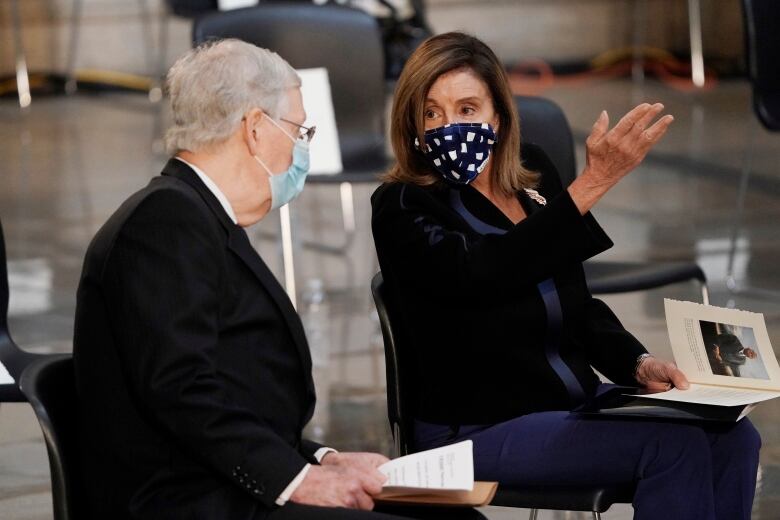![[CBC]Coronavirus: What’s happening around the world on Tuesday | CBC News [CBC]Coronavirus: What’s happening around the world on Tuesday | CBC News](https://i.cbc.ca/1.5665462.1595935454!/fileImage/httpImage/image.jpg_gen/derivatives/16x9_620/1227806087.jpg)
The latest:
- Vietnam suspends flights to and from Danang due to outbreak.
- International Monetary Fund approves $4.3 billion US emergency loan to South Africa.
- UN releases $100 million US from emergency fund for 10 countries’ pandemic relief.
- Head of Chinese CDC is injected with experimental vaccine.
- Virus-linked hunger tied to 10,000 more child deaths each month.
The biggest test yet of an experimental coronavirus vaccine got underway Monday with the first of some 30,000 Americans rolling up their sleeves to receive shots created by the U.S. government as part of the all-out global race to stop the pandemic.
The glimmer of hope came even as Google, in one of the gloomiest assessments of the coronavirus’s staying power from a major employer, decreed that most of its 200,000 employees and contractors should work from home through next June — a decision that could influence other big companies.
Final-stage testing of the vaccine, developed by the U.S. National Institutes of Health and Moderna Inc., began with volunteers at numerous sites around the U.S. given either a real dose or a dummy without being told which.
“I’m excited to be part of something like this. This is huge,” said Melissa Harting, a 36-year-old nurse who received an injection in Binghamton, N.Y. Especially with family members in front-line jobs that could expose them to the virus, “doing our part to eradicate it is very important to me,” she said.



Meanwhile, Senate Republicans on Monday rolled out their $1 trillion coronavirus relief package proposal, as House Speaker Nancy Pelosi implored the White House and GOP lawmakers to stop their infighting and come to the negotiating table with Democrats.
Aid runs out Friday for a $600 US weekly jobless benefit that Democrats call a lifeline for out-of-work Americans.
Republicans want to slash it to $200 a week, saying that the federal bump is too generous on top of state benefits and is discouraging employees from returning to work.
What’s happening with coronavirus in Canada
As of 7:30 a.m. ET on Tuesday, Canada had 114,597 confirmed and presumptive coronavirus cases. Provinces and territories listed 99,860 of the cases as recovered or resolved. A CBC News tally based on provincial reports, regional health information and CBC’s reporting indicates that 8,936 Canadians have died.
What’s happening in the rest of the world
The United Nation’s humanitarian aid co-ordinator has unlocked another $100 million US from its emergency fund to help 10 under-resourced countries in Africa, the Middle East and the Americas meet pressing needs made worse by the pandemic.
The injection from the Office for the Co-ordination of Humanitarian Affairs brings the total to $225 million US released to help 20 countries this year, a record allocation from its Central Emergency Response Fund. Yemen, which the agency says is facing the world’s worst humanitarian crisis, is to receive $35 million, the most of any country.
Other top beneficiaries include Afghanistan, Colombia, Mozambique, Nigeria and Pakistan.



Meanwhile, virus-linked hunger is leading to the deaths of 10,000 more children a month over the first year of the pandemic, according to an urgent call to action from the UN shared with The Associated Press ahead of its publication in the Lancet medical journal.
Further, more than 550,000 additional children each month are being struck by what is called wasting, according to the UN — malnutrition that manifests in spindly limbs and distended bellies. Over a year, that’s up 6.7 million from last year’s total of 47 million. Wasting and stunting can permanently damage children physically and mentally, transforming individual tragedies into a generational catastrophe.
The International Monetary Fund has approved a $4.3 billion emergency loan to South Africa as it reels under the coronavirus pandemic with the world’s fifth-largest virus caseload, and confirmed cases approaching half a million.
The fact that Africa’s most developed country for the first time approached the IMF for a loan is the latest sign of its pain. Unemployment is above 30 per cent and rising, and major state-owned enterprises were already in poor shape.



The Madrid regional government in Spain is making the wearing of face masks mandatory in all public areas, limiting how many people can gather in one place and targeting young people in a drive to stamp out new outbreaks of the coronavirus.
Regional government head Isabel Diaz Ayuso said an information campaign will focus on young people, who are largely blamed for spreading the coronavirus through their social lives. She said young people “have it in their hands to reverse the trend.”
Madrid, along with Catalonia, is one of Spain’s worst-hit regions. It has recorded more than 74,000 cases, with almost 1,900 new infections in the past two weeks.
Vietnam has locked down its third-largest city for two weeks after 15 cases of coronavirus were found in a hospital.
Public transport into and out of the central city of Danang was cancelled. Over the weekend, thousands of mostly Vietnamese tourists had to end their summer holidays in the popular beach destination.
Authorities estimated several thousand people would be stranded by the transportation shutdown and asked hotels to shelter them.
The government on Sunday had ordered physical distancing and the closure of nonessential businesses in the city of 1.1 million people.



The head of the Chinese Centre for Disease Control and Prevention, Gao Fu, says he has been injected with an experimental coronavirus vaccine in an attempt to persuade the public to follow suit when one is approved.
China has positioned itself to be a strong contender in the race for a vaccine. Eight of the nearly two-dozen potential vaccines in various stages of human testing worldwide are from China, the most of any country.
The Associated Press reported earlier this month that a state-owned Chinese company injected employees with experimental shots in March, even before the government-approved testing in people — a move that raised ethical concerns among some experts.
The capital Beijing also reported its first case of domestic transmission in more than two weeks, while the northeastern province of Liaoning added another six cases in its local outbreak. Another four cases were found among Chinese travellers arriving from outside the country, bringing the daily total over the past 24 hours to 68.
![[The Northlines]AESL student from Hooghly, Ritam Banerjee tops West Bengal in JEE Main 2024 [The Northlines]AESL student from Hooghly, Ritam Banerjee tops West Bengal in JEE Main 2024](https://thenorthlines.com/wp-content/uploads/2024/04/Hooghly-820x394-1.webp)
![[espncricinfo]Ramharack stars with four as West Indies clinch thriller against Pakistan [espncricinfo]Ramharack stars with four as West Indies clinch thriller against Pakistan](https://img1.hscicdn.com/image/upload/f_auto/lsci/db/PICTURES/CMS/379800/379874.6.jpg)

![[Rising Kashmir]Power wretchedness: ‘Is KPDCL making concocted promises or is unable to cater expected services to consumers’ [Rising Kashmir]Power wretchedness: ‘Is KPDCL making concocted promises or is unable to cater expected services to consumers’](https://img.risingkashmir.com/wp-content/uploads/2024/04/26232457/images-17.jpg)
![[Anadolu]Shanghai Cooperation Organization talks boosting cooperation [Anadolu]Shanghai Cooperation Organization talks boosting cooperation](https://cdnuploads.aa.com.tr/uploads/Contents/2024/04/26/thumbs_b_c_6eceda2d8c74b109816dbf7b61895318.jpg?v=192013)
![[The Hindu]Watch | Foreign interference in elections | Is there a basis for India’s fears? [The Hindu]Watch | Foreign interference in elections | Is there a basis for India’s fears?](https://th-i.thgim.com/public/videos/i9l66b/article68111415.ece/alternates/FREE_1200/71.jpg)
![[The Northlines]Govt Declares Services Of 36 Members Of J&K Secretariat (Subordinate) Service As Quasi-Permanent [The Northlines]Govt Declares Services Of 36 Members Of J&K Secretariat (Subordinate) Service As Quasi-Permanent](https://thenorthlines.com/wp-content/uploads/2024/04/showorder7887274776810803301-714x1024.png)
![[Daily Excelsior]Nearly 61 Per Cent Turnout In Phase 2 Of LS Polls; Tripura Records 78.53 Pc, Manipur 77.18 [Daily Excelsior]Nearly 61 Per Cent Turnout In Phase 2 Of LS Polls; Tripura Records 78.53 Pc, Manipur 77.18](https://cdndailyexcelsior.b-cdn.net/wp-content/uploads/2024/04/VOTE-6-696x443.jpg)
![[Indian Express]Adhyayan Suman says he became overconfident after Raaz 2 success, signed 12 films as people listed him with Ranbir Kapoor, Imran Khan: ‘Then life took u-turn’ [Indian Express]Adhyayan Suman says he became overconfident after Raaz 2 success, signed 12 films as people listed him with Ranbir Kapoor, Imran Khan: ‘Then life took u-turn’](https://data.indianexpress.com/election2019/track_1x1.jpg)
![[Daily Excelsior]Govt Declares Services Of 36 Members Of J&K Secretariat (Subordinate) Service As Quasi-Permanent [Daily Excelsior]Govt Declares Services Of 36 Members Of J&K Secretariat (Subordinate) Service As Quasi-Permanent](https://cdndailyexcelsior.b-cdn.net/wp-content/uploads/2021/05/secretariat.jpg)
![[Free Press Journal]’They Deserve To Go When They Want’: Yuvraj Singh Says Virat Kohli And Rohit Sharma Have A Right To Make Call On Their Retirement [Free Press Journal]’They Deserve To Go When They Want’: Yuvraj Singh Says Virat Kohli And Rohit Sharma Have A Right To Make Call On Their Retirement](https://media.assettype.com/freepressjournal/2024-04/be054c4c-1037-4b02-a544-8f63faaf0936/GL1lHHhXYAAlv1n.png)
![[Times of India]Australia legend picks Virat Kohli over Rohit Sharma to open with Yashasvi Jaiswal in T20 World Cup | Cricket News – Times of India [Times of India]Australia legend picks Virat Kohli over Rohit Sharma to open with Yashasvi Jaiswal in T20 World Cup | Cricket News – Times of India](https://static.toiimg.com/photo/msid-109630409,imgsize-28966.cms)

![[CBC]How an Afghan supermarket chain in Hamilton is helping newcomers find work | CBC News [CBC]How an Afghan supermarket chain in Hamilton is helping newcomers find work | CBC News](https://i.cbc.ca/1.7165043.1712340398!/fileImage/httpImage/image.jpg_gen/derivatives/original_780/samir-s.jpg)
![[CBC]India calls allegations of foreign interference in Canada's elections 'baseless' | CBC News [CBC]India calls allegations of foreign interference in Canada's elections 'baseless' | CBC News](https://thumbnails.cbc.ca/maven_legacy/thumbnails/491/691/truinpak.jpg?crop=1.777xh:h;*,*&downsize=510px:*510w)
![[CBC]Toronto couple fights to rid home of heritage status over original owner's 'racist' views | CBC News [CBC]Toronto couple fights to rid home of heritage status over original owner's 'racist' views | CBC News](https://i.cbc.ca/1.7163923.1712262509!/fileImage/httpImage/image.jpeg_gen/derivatives/original_780/racisthouse-house.jpeg)
![[CBC]Han Dong tells foreign interference inquiry he tried to help Spavor and Kovrig, wants to be a Liberal again | CBC News [CBC]Han Dong tells foreign interference inquiry he tried to help Spavor and Kovrig, wants to be a Liberal again | CBC News](https://thumbnails.cbc.ca/maven_legacy/thumbnails/543/19/dong_on_busses.jpg?crop=1.777xh:h;*,*&downsize=510px:*510w)
![[CBC]Mysterious writer behind ISIS-K propaganda calls himself 'the Canadian' | CBC News [CBC]Mysterious writer behind ISIS-K propaganda calls himself 'the Canadian' | CBC News](https://i.cbc.ca/1.7157662.1711572226!/fileImage/httpImage/image.jpg_gen/derivatives/original_780/voice-of-khurasan.jpg)
